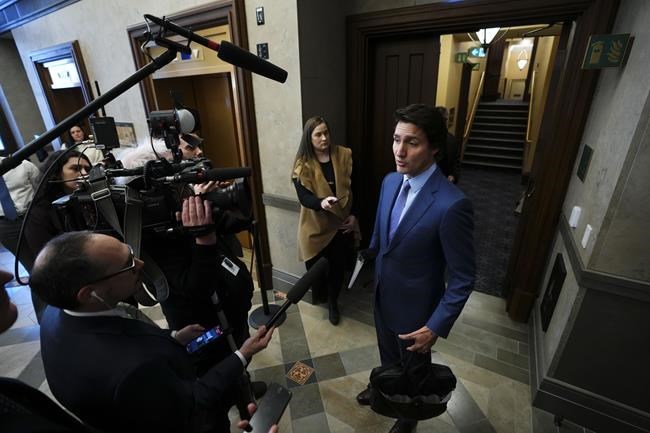OTTAWA β Prime Minister Justin Trudeau will offer the provinces a "significant" increase to the Canada Health Transfer and additional money if they agree to one-on-one deals targeting specific problem areas in the health-care system.
A senior government official with knowledge of the plan said Trudeau will lay out a 10-year offer when he meets with the country's 13 premiers in Ottawa on Tuesday.
The Canadian Press agreed to grant the official anonymity because they were not authorized to speak publicly about the matter.
They said the offer will include a top-up to the annual Canada Health Transfer, which Ottawa sends to the provinces each year with very few strings attached. This year Ottawa transferred $45 billion, which amounts to 22 per cent of what the provinces budgeted for health care.
The premiers want Ottawa to fund 35 per cent, which this year would have required $26 billion more.
Trudeau will offer more money to provinces that make one-on-one deals in specific areas, and with accountability measures attached such as setting targets for improvement and data sharing.
Health Minister Jean-Yves Duclos has previously said the federal government's priority areas include improving access to family doctors, better mental health care, cutting surgical backlogs and a massive improvement to data collection and sharing.
The government's offer will be made public but not until after it's given to the premiers on Tuesday.
Manitoba Premier Heather Stefanson, who is currently the chair of the premiers' group known as the Council of the Federation, said the fact premiers haven't seen any details yet is frustrating.
"If we had it ahead of time we could have had a more fulsome discussion tomorrow," she said. "There's no question about that."
She wouldn't say if the premiers are flexible on the 35 per cent ask, or what concessions or strings they are open to.
"We want to see what the proposal will look like," she said. "We'll go in with an open mind and then we'll go from there."
Trudeau said his government doesn't expect to sign the same deal with every province.
"We recognize that different provinces have different needs and different priorities, and that flexibility is an important part of our responsibility," he said Monday.
After Tuesday's talks, Duclos and the provincial health ministers will meet to keep working out the details. There is no specific deadline but the hope is that a new deal will be in place before the next federal budget, which is generally tabled in the early spring.
The federal official said one of Ottawa's key asks is that the provinces agree to common indicators and the collection and sharing of data, both with other provinces and with Canadians. They said it's needed to better understand the extent of the problems and to be able to measure progress.
Former health minister Jane Philpott, who was in charge of the file in 2017 when the last federal-provincial health talks took place, said Monday that is a critical element of any successful plan.
In 2017, Ottawa signed bilateral deals with each province and territory to flow $11.5 billion over 10 years to improve mental health care and home care. The deals included an agreement that the provinces would annually report some common indicators. While that has happened, the data is often incomplete and assessing progress is difficult.
"As I look back on that, I would say that the agreements were not as specific as they could have been, and I think that's the lesson to be learned on this round," Philpott said.
"When the federal government puts more money on the table, there needs to be accountability for how that money is spent. I think this time I would advise being much more specific about those expectations and potentially even using legislative tools to be able to ensure that the outcomes will be what they need to be."
She said that could include clawing back money if provinces don't meet their obligations.
Philpott said the lack of information about how the health-care system is performing is a major issue, as is the lack of hard targets for progress.
An estimated six million Canadians don't have access to a family doctor or primary care team, and Philpott said a hard target should be to make sure every Canadian has access within five to seven years.
But to do that we'd need to know a lot more about the doctors we have, where they are, and how many hours they work.
"We don't actually know how many practising family doctors there are in the country, which is a shocking thing," she said.
Health workersβ unions and associations began ringing alarms about the dwindling number of health-care professionals in the early days of the pandemic. Since then, worker burnout has turned a bad situation into a crisis. They say without a long-term plan to shore up their ranks there is little that can be done to improve the state of health care in Canada.
NDP Leader Jagmeet Singh said Monday "any agreement that does not include clear commitments to hire more front-line health care workers would be a failure."
The Conservatives have been hesitant to comment before seeing Trudeau's offer but are concerned about the cost.
βWhat we've seen over the last eight years is that Justin Trudeau has thrown money at all kinds of different challenges and, in general, things are getting worse,β said Conservative MP Garnett Genuis Monday.
βWhen we see a proposal from the government we'll review it, we'll see whether the government's actually going to get us out of the failures theyβve caused.β
This report by The Canadian Press was first published Feb. 6, 2023.
Mia Rabson, Laura Osman and Mickey Djuric, The Canadian Press




